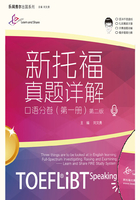
TPO 2
2-1
请介绍一个你常去且对你而言有重要意义的地方,并举例详细说明其原因。
response
I like to go visit Hutongs in old Beijing. I was raised in a Hutong when I was a child, and I always remember the happy times when I played with many children in the narrow walkways. The neighborhood was very friendly, and everybody knew each other. It reminds me of a China that predates modern development and it serves as a connection between the old and the new. The Hutongs are becoming rarer, and I would like to continue visiting them.
2-2
有些大学生倾向于选修各种不同学科领域中的课程,以期拓宽知识面;而另外一些大学生则专注于某一个特定的学科领域,以求对该专业知识有较深入的理解。谈谈你认为哪种选课方法对学生而言更合适并解释原因。
response
To me, college should both broaden and deepen one’s knowledge. I think that at the beginning of college, perhaps for the first and second year students, it is good to receive a broad education. Taking a wide range of courses allows these students to become knowledgeable about many subjects and makes them better-rounded. Once students decide on a major, focusing on that single subject is the best, as this will allow them to truly excel in the field they choose to enter.
2-3
阅读材料:计划取消校车服务
大学已决定停止向学生提供免费的校车服务,原因是运营校车的费用很高而搭乘校车的学生却非常有限。目前,校车从校园中心驶出,途经大学的一些校舍以及校园周边地区。通过取消校车服务而节省下来的开支将会用于扩建那过度拥挤的学生停车场。
题目:对话中,男生针对学校取消校车服务这个计划阐述了个人意见。陈述他的观点以及他给出的原因。
response
The man believes that eliminating the bus service is a bad idea. For one, he believes that it is the administration’s fault that no one rides the buses. The buses currently follow the old routes, which go through areas that are now too expensive for students to live in. Since the bus travels to areas where students don’t live, he says, why would they ride the bus? Also, he doesn’t like the larger parking lots that will be built. He says that the larger lots would encourage more students to drive on campus, which would increase both noise and traffic. He suggests that a better solution is to fix the bus routes and to keep the buses.
2-4
阅读材料:社会互动
人们每天都要跟其他人打交道,而这种互动是社会生活的核心。有关社会互动的研究旨在研究人们的行为给他人带来的影响。人们在日常行事中常常会把他人考虑在内,事实上,他人的存在本身就会影响人们的行为。举例来说,一个社会互动方面的原理被称为“观众效应”,其大意为:人们的工作会因获知被其他人注视而受影响,因此他人的举止被认为易于改变人们的行为与活动的方式。
题目:解释系鞋带和学习打字这两个例子是如何论证“观众效应”原理的。
response
The principle of audience effects suggests that our work and our actions will change when we know that other people can see us. The professor demonstrates this through two examples. First, he describes an experiment in which two groups of people were asked to tie their shoes, and only one group was told that they were being watched. This group tied their shoes much faster than the other group. Another example is about learning typing. In a similar study, it was shown that people learning to type often type faster and make more mistakes when they know they are being watched. They tended to make mistakes when giving the appearance of working faster.
2-5
对话中,两人针对这个女生的问题讨论了两种可行的解决方案。描述她所遇到的问题以及这两种解决方案,并给出你的建议并说明理由。
response
The professor is going on a three-day field trip with some of his students. Mary, the woman, applied for the trip but was put on a waiting list. The professor tells Mary that one of the other students quit the trip, and so asks her to go instead. However, Mary, who thought she could not go on the trip before, already told another professor, Professor Clark, that she could help her to set up a museum exhibit. Mary now could either ask Professor Clark if someone else can offer help or try to finish setting up the exhibit by Wednesday so she can go on the trip after. I think the woman should quickly set up the exhibit and then join the trip. In this way, she could fulfill her promise to the other professor and can still go on the trip.
2-6
使用叙述中的观点和事例,来解释教授所阐述的货币的两个定义。
response
The professor gives two definitions of money, a narrow one and a broad one. The professor says that the narrow definition of money is whatever is considered legal tender in a society, or, in other words, whatever must be accepted as money. In most places, this is the note and the coin currency we use to buy things. The professor uses an example of a taxi: in society, the taxi driver must accept coins and bills as payment. The broader definition of money is anything we use to make purchases with. Following the taxi example, the professor says that if the taxi driver gives a farmer a ride in exchange for some vegetables, the vegetables can be considered as currency.